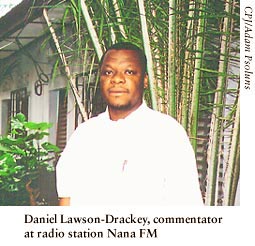New York, March 1, 2007—The Togolese government on Wednesday indefinitely banned from broadcast veteran journalist and media activist Daniel Lawson-Drackey over a commentary on private radio Nana FM that was critical of a government minister, according to local journalists.
“It’s outrageous that the government is censoring a respected journalist for raising critical questions about an issue of public interest,” CPJ Executive Director Joel Simon said. “We call on the Togolese authorities to immediately lift this arbitrary ban on Daniel Lawson-Drackey.”
Drackey, radio commentator and president of Maison du Journalisme, an independent journalists’ resource center in the capital Lomé, was barred from airing his bi-weekly commentary today, he told CPJ. The High Authority on Audiovisual Communications (HAAC) said Drackey’s radio editorials “gravely harmed the dignity of honest citizens,” according to an official letter to Director General Ferdinand Affognon.
The ruling came five days after HAAC summoned Affognon over a February 8 broadcast commentary by Drackey, according to local journalists. The commentary discussed widely-reported allegations of corruption against opposition Public Administration Minister Arthème Ahoomey-Zunu, according to the same sources. Zunu, the board chairman of a state agency managing Togolese markets, was alleged to have pocketed 620,000 CFA francs (US$1,300) for personal expenses, according to local media reports. He has not responded to the allegations, local journalists told CPJ.
“The commentary underscored the responsibility of opposition politicians to uphold good governance when they join the government,” Drackey said. But HAAC President Philippe Evegno said Drackey aired opinions which were “systematic attacks against honest citizens,” he told CPJ. He declined to provide any specific examples.
“HAAC overstepped its authority and this action is illegal under Togolose law because no journalist or broadcaster may be suspended without a court order,” according to Francis Pedro Amuzun, head of the Togolese Media Observatory, a local media regulatory body. “The proper procedure would have been for HAAC to issue a statement of concern over content, but it is most troubling that their ruling did not even name any particular commentary in question,” he said. Local press groups will meet with HAAC in the next few days, he said.
Private radio stations and journalists in Togo have been the victims of arbitrary suspensions by HAAC in recent months. In January, private Radio Victoire was pulled off the air for 15 days and its French analyst indefinitely banned from broadcasting in response to critical coverage of the Togolese soccer association.
